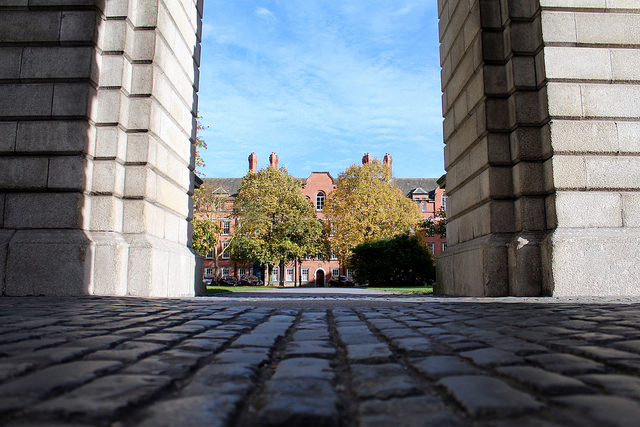Trinity is an establishment steeped in centuries of history that has seen many notable individuals – from Bram Stoker to Edmund Burke and many others – study or teach at the university. Rightly, Trinity has largely maintained a tradition of recognising the achievements of these great thinkers and intellectuals by naming certain parts of the college after them. The news today that College plans to sell the “naming rights” to parts of its campus, however, undermines this longstanding tradition and sheds light on the extent to which funding cuts and lack of resources are currently affecting the university.
Trinity is undoubtedly unique in the way it has named its buildings in the past. For American universities, and even ones closer to home such as University College Dublin (UCD), naming substantial parts of college campuses after donors and companies is not uncommon. Indeed, certain parts of Trinity’s campus such as the O’Reilly Institute and Kinsella Hall are named after donors who have contributed significant sums of money to the construction of these buildings. In these cases, this is not unwelcome.
Trinity is a modern, progressive institution, but its history and traditions remain central to its appeal and identity
Where today’s announcement differs though is that it paves the way for changing the names of Trinity’s buildings en masse. Although College has outlined that “hallowed” parts of the campus, such as Front Square and The Long Room, won’t be involved in the process, there is no evidence to suggest that lecture theatres named after Trinity intellectuals and political figures such as Jonathan Swift, Robert Emmet and Edmund Burke won’t be soon housed in the “Aer Lingus Arts Block”. A ridiculously tacky notion but, after today’s announcement, a possibility. Trinity is a modern, progressive institution, but its history and traditions remain central to its appeal and identity. Today’s announcement will potentially damage this.
Selling “name plates” for different parts of campus for €200,000 each also highlights the magnitude of the financial difficulties Trinity now finds itself in. With the government this year only increasing its allocation to the entire third-level sector by €36.5 million, College must understandably find ways to increase its revenue while Trinity continues to plummet down world ranking tables. Speaking to The University Times in September, Trinity Chief Financial Officer (CFO), Ian Matthews, highlighted that “in 2008, the Exchequer funded 70 per cent of this organisation. In 2015 it funded 43 per cent”. He continued: “Some of the challenges that are put in front of us are very frustrating but we just have to work within the constructs that we have or the confines that we have.”
In recent years, Trinity has seen an increase in commercialisation initiatives in order to replace some of the income lost through cuts to state funding. Schemes such as renting rooms for commercial purposes outside of the college year have been positively received. Others, however, like converting the Hamilton Restaurant into a Bank of Ireland branch, have led to predictable criticism. This latest attempt to increase private funding to the university will be a strategy that many students and staff will be uneasy with.
The selling of Trinity’s naming rights is not totally unforeseen. An article in this newspaper in 2014 after the opening of Kinsella Hall discussed how “if a Trinity alumnus wants to provide thousands or millions in funds to vastly improve the student experience, and the only price for that commitment is gracing the project with his or her surname, everyone should walk away happy”. This seems entirely reasonable. Paying only €200,000 to have a donor or firm’s name grace Trinity’s already existing buildings, though, feels like we’re selling ourselves short. These donations will not be used to create new facilities within the College, but will rather replace existing names and act as mere advertisements in some cases.
Today’s announcement comes as a result of years of cuts and neglect to the third-level sector
Undoubtedly it was not Provost Patrick Prendergast’s intention to sell Trinity’s naming rights when he began his Provostship back in 2011. Today’s announcement comes as a result of years of cuts and neglect to the third-level sector. In a recent speech, Prendergast announced that “fees, philanthropy and commercial activities” would have to be the future of the university. This decision is an example of this. In the same speech, he also indicated that College is looking at “growing our non-exchequer revenue and becoming more financially independent”. The announcement appears to be evidence that College has given up on the State allocating it any significant funding in the foreseeable future.
College has outlined that the process to sell its naming rights “would be done with care and attention to the values of the college campus and community”, and it must be. Selling Trinity’s naming rights feels like it is selling a piece of itself. In the current circumstances though, it is unfortunately left with few other options.







